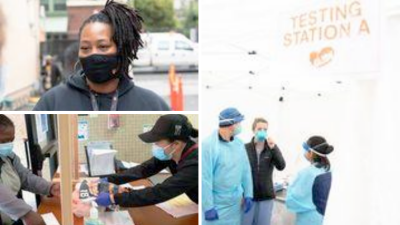WEBINAR: This webinar explores how to measure and communicate your organization's social impact with proven frameworks and strategies that matter to stakeholders.
Confronting the homelessness crisis

This month's Member Spotlight is an excerpt from Issue 33 of the Corporate Citizen.
In the United States, experts say that we may be on the brink of a “homeless pandemic” on top of our current situation with COVID-19.
According to the Aspen Institute, our nation may be facing the most severe housing crisis in its history, with an estimated 30-40 million people at risk of eviction in the next several months. Sadly consistent with many pandemic challenges, this crisis is likely to hit people of color the hardest. New census data reveal that more than one-fifth of Black and Hispanic/Latino adults said their household either missed or was late paying rent or mortgage due in June, more than twice that of white adults.
Compounded by our new normal, the housing challenge has existed for many years—and corporate citizenship programs have rallied to confront it. The Foundation at Wells Fargo—diversified, community-based financial services company with offices in 31 countries and territories—has evolved its philanthropic strategy to help address critical issues including housing affordability and financial health. To address the U.S. housing affordability crisis, including homelessness, available and affordable rentals, transitional housing, and home ownership, Wells Fargo committed $1 billion in philanthropy through 2025. Among many accomplishments in economic development, the bank has helped more than 170,000 African-American and Hispanic individuals purchase homes through 10-year lending commitments to these diverse communities. By thoughtfully targeting the factors that contribute to people falling into homelessness, Wells Fargo is able to leverage its scope of influence and resources to effect real change within communities that need it most.
Headquartered in San Francisco, where a chronic homeless crisis affects thousands of individuals, Wells Fargo cultivates strategic partnerships with local leaders who strive to address this pressing community emergency. GLIDE is one such partner—a leading social service organization, a social justice movement and a spiritual community that has served those most vulnerable in the Bay Area for the past 57 years. Working on the front lines of poverty, GLIDE combines inclusive and loving values with credibility in the community, allowing Wells Fargo to make real connections and serve its community with an evolved, coordinated program model. All the while, both partners amplify the voices of their marginalized neighbors to advocate for wider systemic change.
With the ongoing support of Wells Fargo, GLIDE continues to meet the need during the COVID-19 pandemic, keeping its doors open and providing vital services at a time when impoverished communities need them more than ever. GLIDE has expanded its food security services—an average of 2,100 meals daily delivered in ways that optimize health and safety for clients and staff; conducting more than 350 tests for COVID-19 at GLIDE and providing HIV/HCV testing, overdose prevention, and other harm-reduction services. The Wells Fargo/GLIDE partnership has been working with city agencies to provide referrals for clients to existing and newly designated temporary housing; providing referrals for health services; supporting front-line staff who may require short-term sick or family leave; building ongoing emergency capacity to increase sanitization, installing filtration devices, and stocking appropriate PPE supplies and equipment.
In the first few days of the pandemic, Wells Fargo acted quickly to support GLIDE’s efforts to mitigate transmission and sent the organization enough supplies to stock 500 hygiene kits for distribution to clients in need. Since the onset of the pandemic, GLIDE distributes a daily average of 750 hygiene kits containing soap, travel-sized shampoo, hand sanitizer, and dental care supplies to those struggling to follow health and safety guidelines on the streets of San Francisco.
Such efforts provide GLIDE with the tools to support local communities as they live into their mission of tackling systemic issues such as housing affordability in the context of our new normal. GLIDE Director of Institutional Partnership Leigh Hanson says, “Without the support of partners like Wells Fargo, many of our unhoused neighbors who cannot safely shelter in place would have been at greater risk of contracting the virus, exponentially exposing the entire community to more detrimental health outcomes.”
Read more examples of corporate social responsibility in Issue 33 of the Corporate Citizen.
Related Content
RESEARCH BRIEF - Researchers investigated how ESG activities help or hurt financial performance, using nine years of data from over 1,200 global companies.
RESEARCH BRIEF - Researchers analyzed 4 US energy exchange-traded funds (ETFs) over 15 years, including 2 dirty energy funds tracking fossil fuel companies and 2 clean energy funds tracking renewable energy companies.
RESEARCH BRIEF - Researchers conducted a survey, which measured perceptions of CSR and ethical leadership within the manufacturing and service industries.




